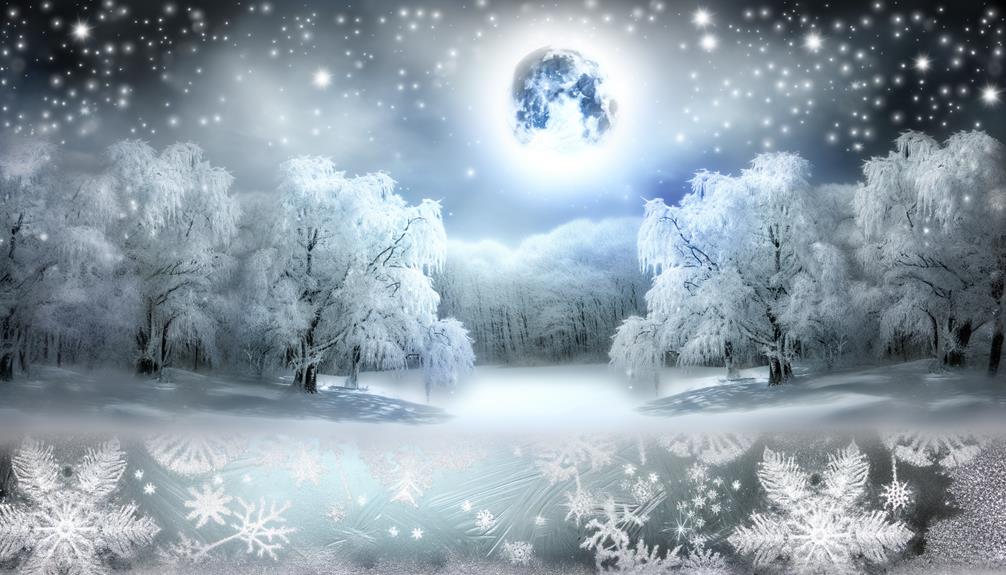Meaning of the Name Winter
The name 'Winter' derives from the Proto-Germanic term *wintruz and Proto-Indo-European root *wend-, symbolizing wet and cold conditions. Historically, it evolved through Old English and other Germanic languages, embodying the coldest season of the year.
Winter signifies periods of hardship, resilience, and renewal in agrarian societies. In literature, it represents desolation, introspection, and transformation.
Culturally, Winter is a unisex name evoking themes of purity, clarity, and endurance. Its modern usage is influenced by celebrity trends and seasonal eco-consciousness.
Continue to explore the historical and cultural layers embedded within this evocative name.

Key Takeaways
- The name Winter originates from the Proto-Germanic word *wintruz, linked to the Proto-Indo-European root *wend-.
- Winter symbolizes the coldest season, representing hardship, resilience, and renewal in historical and cultural contexts.
- In literature, winter evokes themes of desolation, introspection, survival, and transformation.
- The name Winter has seen modern popularity due to celebrity usage and reflects nature's beauty and eco-consciousness.
- Notable individuals named Winter include playwright Winter Miller and actress Winter Ave Zoli, contributing to the name's contemporary prominence.
Etymology of Winter
The etymology of the name Winter traces back to the Proto-Germanic word *wintruz, which itself likely originates from the Proto-Indo-European root *wend-, meaning 'wet' or 'water'. This linguistic lineage underscores the association between the season and its characteristic wet, cold conditions.
The term evolved through Old English as 'winter,' maintaining its foundational meaning. This evolution is consistent across other Germanic languages, such as Old High German's wintar and Old Norse's vetr.
The root *wend- is indicative of the seasonal climatic changes marked by increased precipitation and lower temperatures. Consequently, the etymology of Winter is deeply rooted in the natural phenomena that define the season, reflecting a historical awareness of environmental cycles.
Historical Usage
Throughout history, the name Winter has been consistently used to describe the coldest season of the year, reflecting its climatic significance and cultural impact. Its historical usage is evident in ancient texts, where Winter symbolized not only the environmental conditions but also marked periods of hardship and dormancy.
In agrarian societies, this season necessitated preparations for food storage and survival, deeply influencing communal activities and rituals. Historical records from various civilizations, including Greek, Roman, and Norse, all highlight Winter as a critical phase in the annual cycle.
The term encapsulated more than just weather; it represented a time of reflection, resilience, and renewal. Therefore, the name Winter has maintained its relevance, persisting as a cornerstone in the lexicon of human experience.
Winter in Literature
Winter's profound influence on literature is evident through its persistent portrayal as a symbol of desolation, introspection, and transformation across various genres and eras.
From the barren landscapes in T.S. Eliot's 'The Waste Land' to the introspective solitude in Robert Frost's 'Stopping by Woods on a Snowy Evening,' winter often evokes a sense of existential reflection.
In Charles Dickens' 'A Christmas Carol,' winter serves as a backdrop for transformation, mirroring Scrooge's cold heart thawing into warmth.
The season's starkness frequently reflects characters' inner turmoil, as seen in Dostoevsky's 'Crime and Punishment.'
Historically, winter's harshness has been employed to explore themes of survival and hope, underscoring its essential role in the literary exploration of the human condition.
Cultural Significance
The name Winter carries profound cultural significance, often symbolizing concepts such as death, rebirth, and introspection within literature.
Historically, seasonal traditions associated with winter have influenced various cultural rituals and celebrations, reflecting the season's impact on human life and society.
This exploration will analyze how the symbolism of winter and its associated traditions contribute to a deeper understanding of the name's enduring resonance.
Symbolism in Literature
In literature, the name Winter often symbolizes themes of desolation, introspection, and the dormant potential awaiting renewal.
Historically, Winter has been employed by authors to evoke a sense of barrenness and solitude, as seen in works like James Joyce's 'The Dead,' where the season underscores emotional isolation.
The bleakness of Winter serves as a powerful metaphor for inner reflection, prompting characters to confront their innermost thoughts and regrets.
Additionally, it represents a period of stasis, suggesting a latent potential poised to awaken with the coming of Spring.
This duality of despair and hope imbues Winter with profound symbolic resonance, making it a recurring motif in literary explorations of human experience and transformation.
Seasonal Traditions
Many cultures around the world have developed unique traditions and rituals to celebrate and endure the Winter season, each reflecting their historical and environmental contexts. These traditions often serve to reinforce community bonds and provide psychological comfort during the colder months. For example, the Scandinavian Yule, rooted in ancient Norse traditions, involves feasts and the burning of a Yule log. In Japan, the New Year's celebration, or Shogatsu, is marked by temple visits and special foods. These practices not only offer a reprieve from winter's harshness but also underscore cultural identity.
| Culture | Winter Tradition |
|---|---|
| Scandinavian | Yule |
| Japanese | Shogatsu |
| Russian | Maslenitsa |
| Chinese | Chinese New Year |
| Jewish | Hanukkah |
Modern Popularity
The name Winter has experienced a resurgence in modern times, partly due to its adoption by celebrities, which has greatly influenced naming trends.
Additionally, its seasonal connotations evoke imagery and emotions associated with the winter months, contributing to its appeal.
This combination of celebrity endorsement and evocative seasonal imagery has propelled Winter into contemporary naming practices.
Celebrities Naming Trends
Amid the myriad influences shaping contemporary baby naming conventions, celebrities have propelled the name Winter into modern popularity. This phenomenon can be attributed to several factors:
- Visibility and Influence: High-profile individuals often set trends through the sheer visibility of their personal choices, from fashion to baby names.
- Desire for Uniqueness: Celebrities frequently opt for distinctive names to guarantee their children stand out, thereby making names like Winter desirable and memorable.
- Cultural Shifts: The increased acceptance and celebration of unconventional names reflect broader societal changes, often initiated by influential figures.
Historically, the name Winter was seldom used as a first name. However, recent years have seen a marked increase in its adoption, largely due to the trendsetting actions of public figures.
Seasonal Influence on Names
Driven by a fascination with nature and the changing seasons, modern parents increasingly favor names like Winter, reflecting a broader societal trend that embraces the beauty and symbolism of the natural world.
Historically, names tied to seasons or natural elements have surfaced periodically, yet their resurgence in contemporary times indicates a shift towards eco-consciousness and a deeper connection to the environment.
The name Winter, evoking imagery of purity, tranquility, and resilience, appeals to parents seeking unique yet meaningful names. Moreover, the rising popularity of such names coincides with heightened awareness of environmental issues and a romanticized view of nature, suggesting that seasonal names are not just a fleeting trend but a reflection of evolving cultural values.
Winter as a Unisex Name
Historically, the name Winter has been embraced as a unisex name, reflecting cultural shifts towards more gender-neutral naming conventions. This adoption signifies broader social changes and the evolving perceptions of identity and gender. The name Winter transcends traditional gender boundaries, appealing to parents seeking a distinctive and versatile moniker for their children.
- Cultural Relevance: The use of Winter as a unisex name aligns with contemporary trends favoring non-binary and inclusive language.
- Popularity: Statistical data indicate a steady rise in the name's usage across both male and female demographics.
- Media Influence: The portrayal of characters named Winter in literature and media contributes to the name's unisex appeal.
This multifaceted adoption underscores the name's adaptability and modernity.
Symbolic Meanings
Beyond its role as a unisex name, Winter carries rich symbolic meanings that resonate across various cultures and traditions. Historically, winter represents a period of rest and reflection, often symbolizing the cycle of life, death, and rebirth.
In many mythologies, winter is seen as a time of introspection and inner growth, a phase preceding the renewal of spring. The stark, serene landscapes of winter often evoke themes of purity and clarity.
In literature and art, winter frequently symbolizes endurance and resilience, reflecting the human capacity to withstand adversity. Additionally, winter can embody notions of transformation, as the dormant period it signifies is essential for the eventual blossoming of new life.
Thus, the name Winter is imbued with profound and multifaceted symbolism.
Notable People Named Winter
Several distinguished individuals named Winter have made significant contributions across various fields, showcasing the name's presence in diverse areas of achievement. The historical and cultural impact of these figures is evident through their varied accomplishments.
- Winter Miller: An esteemed playwright and journalist, Miller is known for her powerful works addressing social issues, particularly her play 'In Darfur,' which brings attention to the humanitarian crisis in Sudan.
- Winter Ave Zoli: This American actress gained recognition for her role as Lyla Winston in the television series 'Sons of Anarchy,' demonstrating her versatility and depth in performance.
- Winter Ramos: An author and former music executive, Ramos provides a candid insider view into the hip-hop industry with her book 'Game Over,' outlining her experiences and challenges in the music business.
Conclusion
The name Winter, rooted in the Old English 'wintr' and Proto-Germanic 'wintruz,' has traversed a fascinating historical and literary landscape. Its cultural resonance spans centuries, embodying both starkness and renewal.
As a name, Winter has gained modern traction, appealing as a unisex option. Symbolically rich, it evokes the cyclical nature of life.
Like snowflakes falling on fertile ground, the name Winter continues to leave a distinctive imprint, gracing notable individuals across diverse fields.






